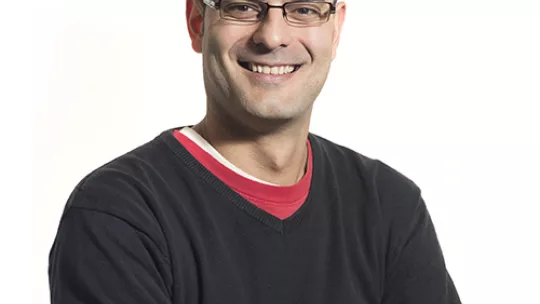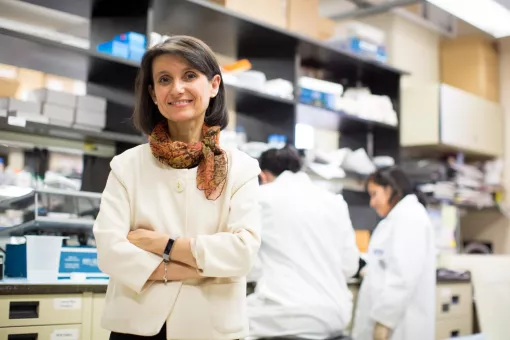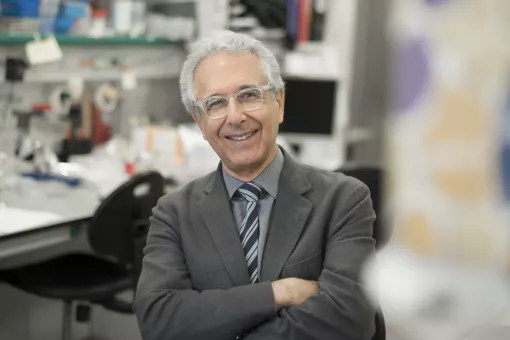Images
Advanced Grants from the European Research Council (ERC) support researchers who have made important scientific achievements in the last 10 years.
The ICREA researcher at IRB Barcelona has been granted €2.5 M to continue his studies on the effects of diet on metastasis.
With this new award, the centre now holds 14 grants from the ERC.
The European Research Council (ERC), a pan-European public organisation that funds research projects, has awarded Salvador Aznar Benitah, ICREA researcher and head of the Stem Cells and Cancer laboratory at the Institute for Research in Biomedicine (IRB Barcelona), an Advanced Grant worth €2.5 M. This award will allow him to undertake a five-year project called “Dietary Influences on Metastasis: How, When, and Why”.
The project aims to unravel the behaviour of metastatic cells and, in particular, pinpoint the influence of fatty acids, especially palmitic acid, on metastasis, a process that is the leading cause of cancer-related deaths. This project collects and explores the conclusions reached by Aznar Benitah in 2016, published in Nature, on the relationship between the onset of metastasis and the intake of fats.
An ambitious project ahead
Aznar Benitah and his group will combine state-of-the-art in vivo functional models of metastasis with quantitative metabolomics, proteomics, and epigenetics, among others, as well as integrated computational analyses, using preclinical models and patient-derived carcinomas of melanoma, oral cancer and breast cancer. This research will allow them to study metastasis and the systemic, cellular, and molecular mechanisms underlying this process.
"We’re very excited about the opportunity that the European Union has given us. We know that it’s an ambitious project that can provide very interesting data on metastasis, which we will be able to apply in diverse studies. However, I believe that this kind of work should also be supported by private foundations, public institutions and philanthropic actions in Spain, "says Aznar Benitah.
From Starting Grant to Advanced Grant
"My lab experienced a qualitative change when we received the ERC Starting Grant in 2012. So we’re acutely aware of the effect that this ERC Advanced Grant will have on our capacity over the next five years to do quality research and to answer complex questions," emphasises Aznar Benitah.
The grant will also allow the hiring of PhD students and postdoc researchers, thus supporting the development of their careers and their capacity as researchers. In addition, they will have the opportunity to be part of a multidisciplinary team that works towards high-quality science.
About the ERC
Since 2007, the ERC has given funding to internationally recognised researchers who carry out cutting-edge research in Europe. Projects with a strong multidisciplinary component and with innovative applications in emerging fields are awarded.
The ERC Advanced Grants are aimed at senior researchers with at least 10 years’ experience. In this edition, in the field of Life Sciences, 636 projects have been submitted and 83 have been selected. In Spain, three laboratories (IRB Barcelona, ICFO and ISGlobal Barcelona) have received the grant in this field.
Currently, IRB Barcelona holds ERC funding totalling more than €24 M for 14 projects.
About IRB Barcelona
The Institute for Research in Biomedicine (IRB Barcelona) pursues a society free of disease. To this end, it conducts multidisciplinary research of excellence to cure cancer and other diseases linked to ageing. It establishes technology transfer agreements with the pharmaceutical industry and major hospitals to bring research results closer to society, and organises a range of science outreach activities to engage the public in an open dialogue. IRB Barcelona is an international centre that hosts 400 researchers and more than 30 nationalities. Recognised as a Severo Ochoa Centre of Excellence since 2011, IRB Barcelona is a CERCA centre and member of the Barcelona Institute of Science and Technology (BIST).






